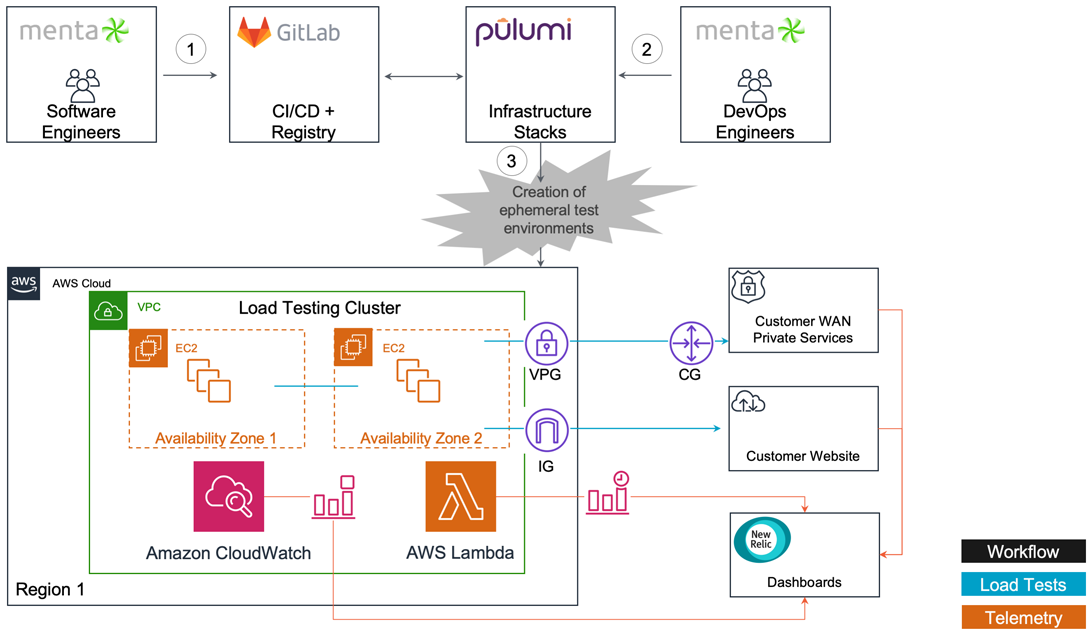Executive Summary
Menta Network was looking for the right tools to build a robust, scalable, and cost-effective load testing service for their clients in the retail sector. They needed cloud infrastructure that could be quickly deployed, scaled, and decommissioned while evaluating the unique traits of each e-commerce site that they worked with. The team also wanted tools that were familiar to engineering and fit within their existing tooling and CI/CD workflow. After evaluating multiple options, Menta Network chose Pulumi as their Infrastructure as Code solution because it made defining and provisioning infrastructure on Amazon Web Services far easier than other tools.
About Menta Network
Menta Network is a professional services company located in Mexico City that provides quality and performance assurance and monitoring for their clients’ applications and infrastructure. They regularly need to spin up, scale, and destroy new cloud environments as part of their managed load testing solution, which helps clients to evaluate their web services and applications.
Customer Challenge
In Menta Network’s local market, there are multiple ‘Black Friday’-style retail events including El Buen Fin (“The Good Weekend”) in November, and “Hot Sale” in May. Together, these events capture a significant share of the $22.6B total e-commerce revenue in Mexico and drive extremely high traffic to retailers’ websites during sale events.
For Menta Network’s retail clients, having a responsive and performant digital experience is the key to success during these sales. This is especially critical as Mexico has one of the fastest-growing e-retail markets — growing 35% last year.
To ensure that these services are scalable and ready to survive the crush of sale-driven traffic, clients turn to Menta Network’s managed load testing service to identify and correct issues before big sales weeks begin.
For Menta Network, the challenges came from managing these tests across their client base throughout the year and were both technical and financial. They needed infrastructure for periodic testing that could scale quickly to mimic peak traffic. Then, automation was needed to decommission test resources to minimize the cost of running regular tests at scale. Finally, each client required their own unique configuration and load-tests tailored to their specific web services.
The combination of Pulumi and Amazon Web Services presented the ideal solution to Menta Network’s challenge.
Solution Overview
Menta Network’s team had experience with a variety of legacy and modern configuration management tools; however, previous tools would not allow Menta Network’s engineering team to define infrastructure using their language of choice: Python. Managing each client’s configuration using domain-specific languages (DSLs) proved to be too onerous of a task for both initial implementation and ongoing maintenance.
“At Menta Network we have a lot of experience with Ansible and Puppet but wanted to shift to more modern tools to manage our infrastructure. We tried Terraform but found that Pulumi was far easier to use given its Python support. Ultimately, Pulumi is just as robust as Terraform and has the added benefit of reducing the complexity of managing many configurations and environments.”
— Ernesto Mendoza, CTO
Menta Network has also standardized on GitLab for managing their entire development lifecycle, container registry and continuous integration / continuous deployment (CI/CD) process. Pulumi provided a unique alternative that allowed engineers to define both their load testing application and associated infrastructure in the same language and tooling — perfectly fitting infrastructure into their existing GitLab CI/CD pipeline. Support for GitLab login further simplified engineering workflows.
“Using Pulumi and GitLab provides the Menta team with a simple and robust platform for developing, managing and deploying our managed load testing solution from infrastructure to application.”
— Ernesto Mendoza, CTO
The Menta Network team chose AWS because they wanted the most mature and robust public cloud, trusted by private and public companies in the Mexican e-commerce market and used by the majority of Menta Network’s customers. On top of that, their strategic partners for monitoring and SIEM solutions, New Relic and Sumo Logic provided integrations that were easy to deploy with AWS.
Menta Network’s managed load testing solution employed Amazon EC2 for creating scalable load testing clusters across multiple availability zones, Amazon CloudWatch for telemetry, and Amazon Virtual Private Cloud, Internet Gateways and VPN features for secure networking for their service. The team also chose to use AWS Lambda to automate delivery of mission-critical KPIs to customers’ executive dashboards. Pulumi made configuring and deploying all of these resources across each customer’s environment a snap.

Results
Adopting Pulumi for one project took an engineer just a couple of days, given that the codebase and architecture were already planned for AWS. In the process the team learned that it’s safe to bet on Infrastructure as Code with Pulumi from a very early stage in the engineering process because its abstractions are clear and simple but do not omit important architectural aspects of the underlying cloud services such as AWS Lambda, EC2 and Networking features.
Compared to their previous load testing platform, Menta Network lowered their operating costs by 60% by adopting Pulumi and AWS. They achieved this while leveraging new efficiency afforded by Pulumi to reduce delivery times and increasing features for their customers.
Overall they were pleasantly surprised by the low barrier to entry and ease of use of Pulumi on AWS and plan to adopt Pulumi across all of their AWS projects.
Pulumi Corporation
Pulumi's cloud engineering platform brings infrastructure, developer, and security teams together through a unified software engineering process that tames cloud complexity and accelerates innovation. Using the Pulumi platform, teams can build, deploy, and manage modern cloud applications faster and with more confidence, using any language, any architecture and any cloud. Pulumi lets teams build Universal Infrastructure as Code using popular programming languages (Python, JavaScript, TypeScript, Go, .NET/C#, Java) and markup languages (YAML, JSON, CUE). It enables deploying infrastructure and applications together through a unified delivery process. Finally, teams can manage cloud applications with Policy as Code, better visibility, and controls.